MLC707 Business Law Assignment: Contract Law and Business Issues
VerifiedAdded on 2022/12/20
|8
|2269
|2
Report
AI Summary
This report presents a comprehensive analysis of a business law assignment, specifically addressing contract law principles. The assignment involves two primary issues: the validity of a contract formed through postal communication and the implications of a contract revocation. The first issue examines a scenario where an offer to sell wheat is made, accepted, and later rejected, focusing on the rules of offer and acceptance, including the postal rule. The second issue deals with a business agreement between Robert and Super Supplies Ltd, where the contract is revoked, causing Robert financial loss. The report delves into the essential elements of a valid contract, including mutual intention and consensus ad idem. The analysis considers the application of these legal principles to the specific facts of each case, providing reasoned conclusions on the legal outcomes and potential remedies. The report references relevant case law to support its arguments and offers practical advice based on the findings.
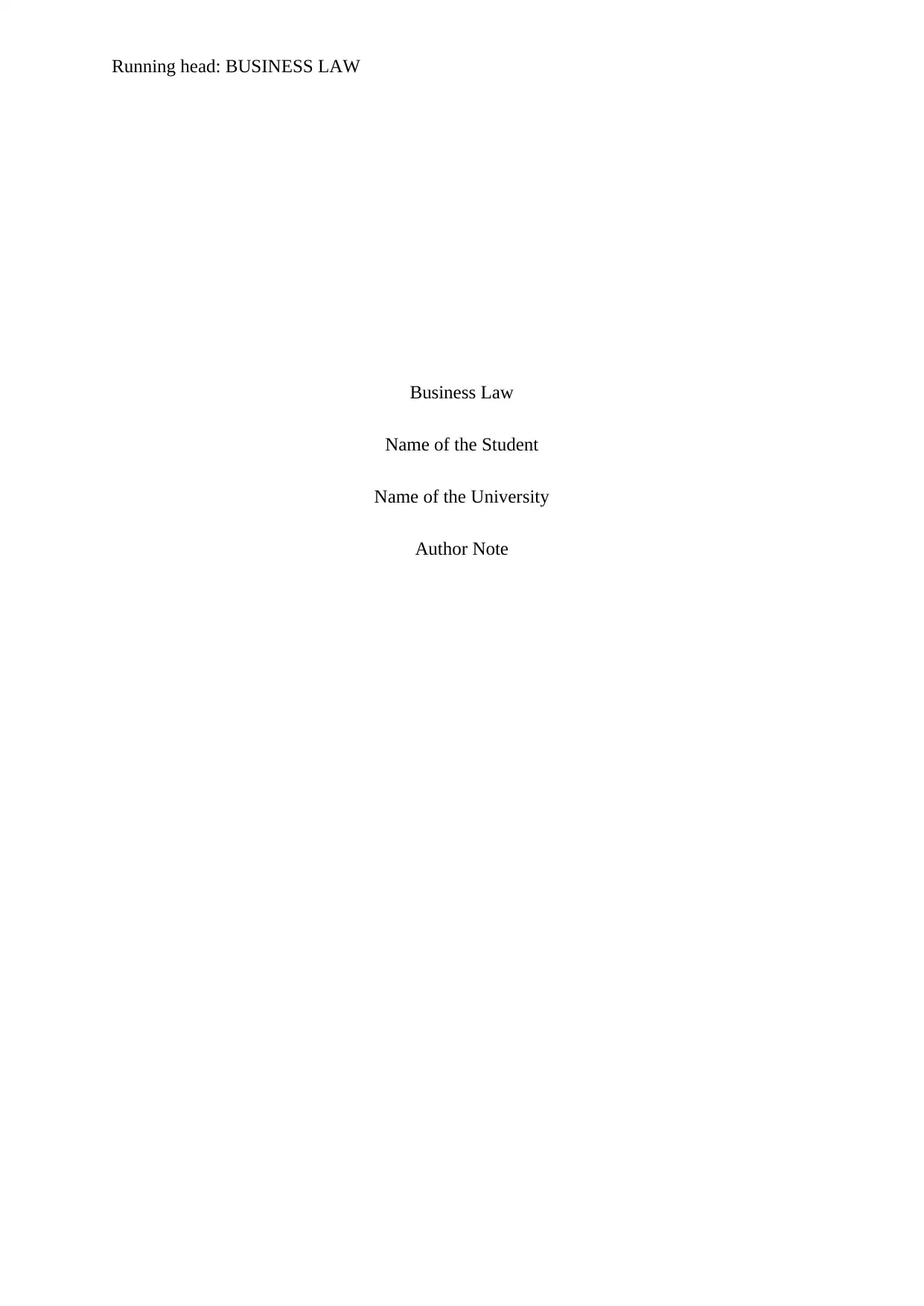
Running head: BUSINESS LAW
Business Law
Name of the Student
Name of the University
Author Note
Business Law
Name of the Student
Name of the University
Author Note
Paraphrase This Document
Need a fresh take? Get an instant paraphrase of this document with our AI Paraphraser
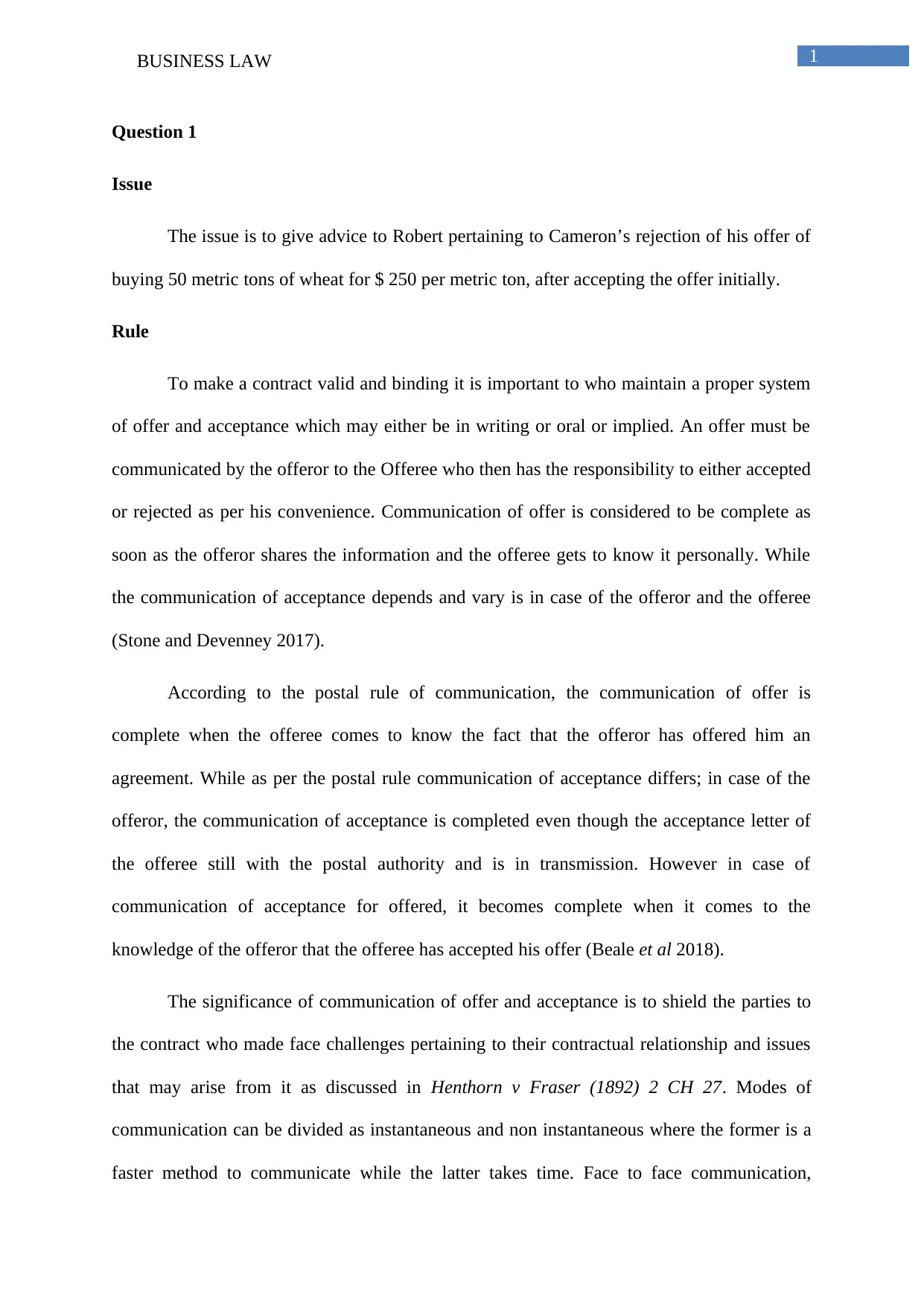
1BUSINESS LAW
Question 1
Issue
The issue is to give advice to Robert pertaining to Cameron’s rejection of his offer of
buying 50 metric tons of wheat for $ 250 per metric ton, after accepting the offer initially.
Rule
To make a contract valid and binding it is important to who maintain a proper system
of offer and acceptance which may either be in writing or oral or implied. An offer must be
communicated by the offeror to the Offeree who then has the responsibility to either accepted
or rejected as per his convenience. Communication of offer is considered to be complete as
soon as the offeror shares the information and the offeree gets to know it personally. While
the communication of acceptance depends and vary is in case of the offeror and the offeree
(Stone and Devenney 2017).
According to the postal rule of communication, the communication of offer is
complete when the offeree comes to know the fact that the offeror has offered him an
agreement. While as per the postal rule communication of acceptance differs; in case of the
offeror, the communication of acceptance is completed even though the acceptance letter of
the offeree still with the postal authority and is in transmission. However in case of
communication of acceptance for offered, it becomes complete when it comes to the
knowledge of the offeror that the offeree has accepted his offer (Beale et al 2018).
The significance of communication of offer and acceptance is to shield the parties to
the contract who made face challenges pertaining to their contractual relationship and issues
that may arise from it as discussed in Henthorn v Fraser (1892) 2 CH 27. Modes of
communication can be divided as instantaneous and non instantaneous where the former is a
faster method to communicate while the latter takes time. Face to face communication,
Question 1
Issue
The issue is to give advice to Robert pertaining to Cameron’s rejection of his offer of
buying 50 metric tons of wheat for $ 250 per metric ton, after accepting the offer initially.
Rule
To make a contract valid and binding it is important to who maintain a proper system
of offer and acceptance which may either be in writing or oral or implied. An offer must be
communicated by the offeror to the Offeree who then has the responsibility to either accepted
or rejected as per his convenience. Communication of offer is considered to be complete as
soon as the offeror shares the information and the offeree gets to know it personally. While
the communication of acceptance depends and vary is in case of the offeror and the offeree
(Stone and Devenney 2017).
According to the postal rule of communication, the communication of offer is
complete when the offeree comes to know the fact that the offeror has offered him an
agreement. While as per the postal rule communication of acceptance differs; in case of the
offeror, the communication of acceptance is completed even though the acceptance letter of
the offeree still with the postal authority and is in transmission. However in case of
communication of acceptance for offered, it becomes complete when it comes to the
knowledge of the offeror that the offeree has accepted his offer (Beale et al 2018).
The significance of communication of offer and acceptance is to shield the parties to
the contract who made face challenges pertaining to their contractual relationship and issues
that may arise from it as discussed in Henthorn v Fraser (1892) 2 CH 27. Modes of
communication can be divided as instantaneous and non instantaneous where the former is a
faster method to communicate while the latter takes time. Face to face communication,
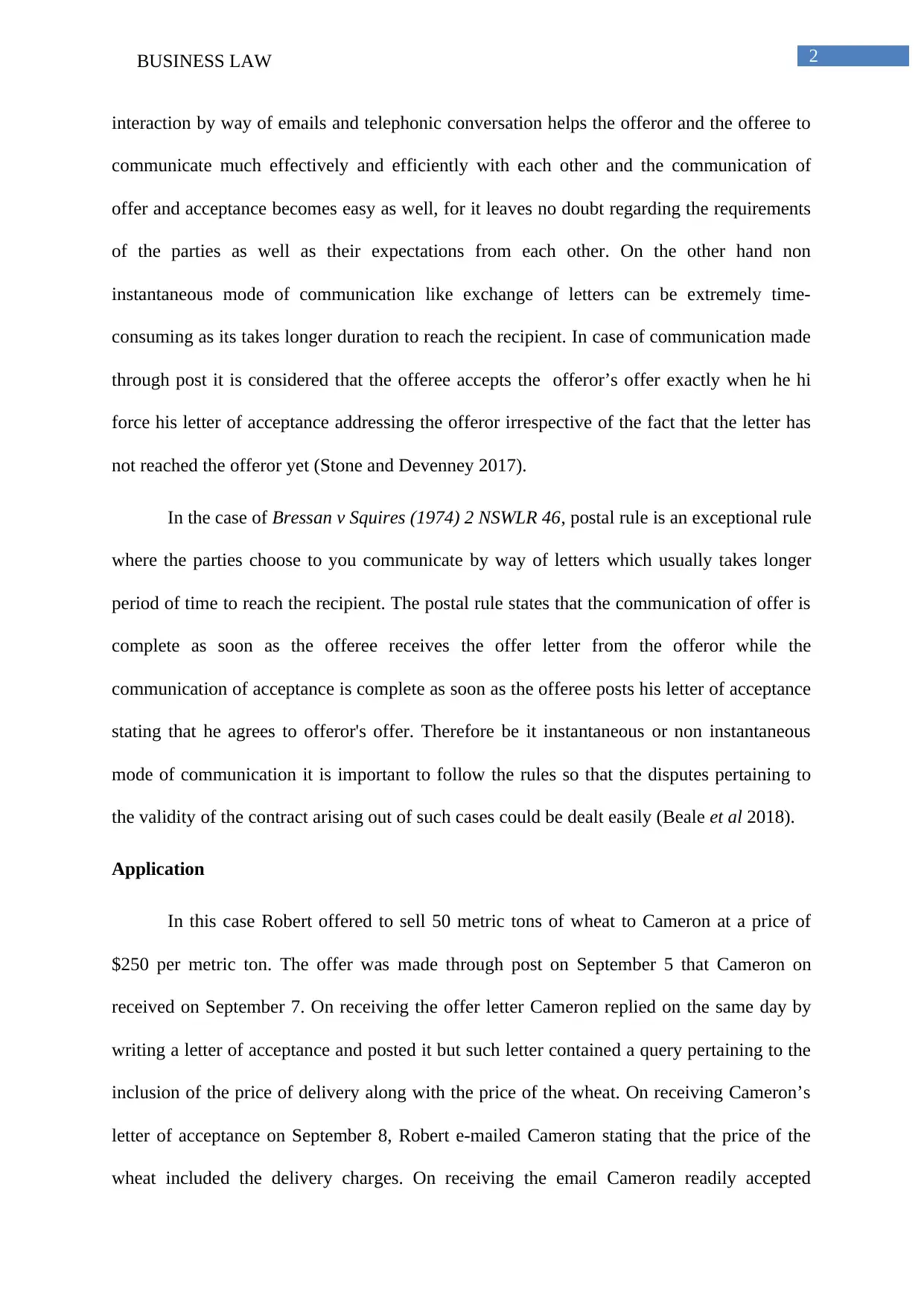
2BUSINESS LAW
interaction by way of emails and telephonic conversation helps the offeror and the offeree to
communicate much effectively and efficiently with each other and the communication of
offer and acceptance becomes easy as well, for it leaves no doubt regarding the requirements
of the parties as well as their expectations from each other. On the other hand non
instantaneous mode of communication like exchange of letters can be extremely time-
consuming as its takes longer duration to reach the recipient. In case of communication made
through post it is considered that the offeree accepts the offeror’s offer exactly when he hi
force his letter of acceptance addressing the offeror irrespective of the fact that the letter has
not reached the offeror yet (Stone and Devenney 2017).
In the case of Bressan v Squires (1974) 2 NSWLR 46, postal rule is an exceptional rule
where the parties choose to you communicate by way of letters which usually takes longer
period of time to reach the recipient. The postal rule states that the communication of offer is
complete as soon as the offeree receives the offer letter from the offeror while the
communication of acceptance is complete as soon as the offeree posts his letter of acceptance
stating that he agrees to offeror's offer. Therefore be it instantaneous or non instantaneous
mode of communication it is important to follow the rules so that the disputes pertaining to
the validity of the contract arising out of such cases could be dealt easily (Beale et al 2018).
Application
In this case Robert offered to sell 50 metric tons of wheat to Cameron at a price of
$250 per metric ton. The offer was made through post on September 5 that Cameron on
received on September 7. On receiving the offer letter Cameron replied on the same day by
writing a letter of acceptance and posted it but such letter contained a query pertaining to the
inclusion of the price of delivery along with the price of the wheat. On receiving Cameron’s
letter of acceptance on September 8, Robert e-mailed Cameron stating that the price of the
wheat included the delivery charges. On receiving the email Cameron readily accepted
interaction by way of emails and telephonic conversation helps the offeror and the offeree to
communicate much effectively and efficiently with each other and the communication of
offer and acceptance becomes easy as well, for it leaves no doubt regarding the requirements
of the parties as well as their expectations from each other. On the other hand non
instantaneous mode of communication like exchange of letters can be extremely time-
consuming as its takes longer duration to reach the recipient. In case of communication made
through post it is considered that the offeree accepts the offeror’s offer exactly when he hi
force his letter of acceptance addressing the offeror irrespective of the fact that the letter has
not reached the offeror yet (Stone and Devenney 2017).
In the case of Bressan v Squires (1974) 2 NSWLR 46, postal rule is an exceptional rule
where the parties choose to you communicate by way of letters which usually takes longer
period of time to reach the recipient. The postal rule states that the communication of offer is
complete as soon as the offeree receives the offer letter from the offeror while the
communication of acceptance is complete as soon as the offeree posts his letter of acceptance
stating that he agrees to offeror's offer. Therefore be it instantaneous or non instantaneous
mode of communication it is important to follow the rules so that the disputes pertaining to
the validity of the contract arising out of such cases could be dealt easily (Beale et al 2018).
Application
In this case Robert offered to sell 50 metric tons of wheat to Cameron at a price of
$250 per metric ton. The offer was made through post on September 5 that Cameron on
received on September 7. On receiving the offer letter Cameron replied on the same day by
writing a letter of acceptance and posted it but such letter contained a query pertaining to the
inclusion of the price of delivery along with the price of the wheat. On receiving Cameron’s
letter of acceptance on September 8, Robert e-mailed Cameron stating that the price of the
wheat included the delivery charges. On receiving the email Cameron readily accepted
⊘ This is a preview!⊘
Do you want full access?
Subscribe today to unlock all pages.

Trusted by 1+ million students worldwide
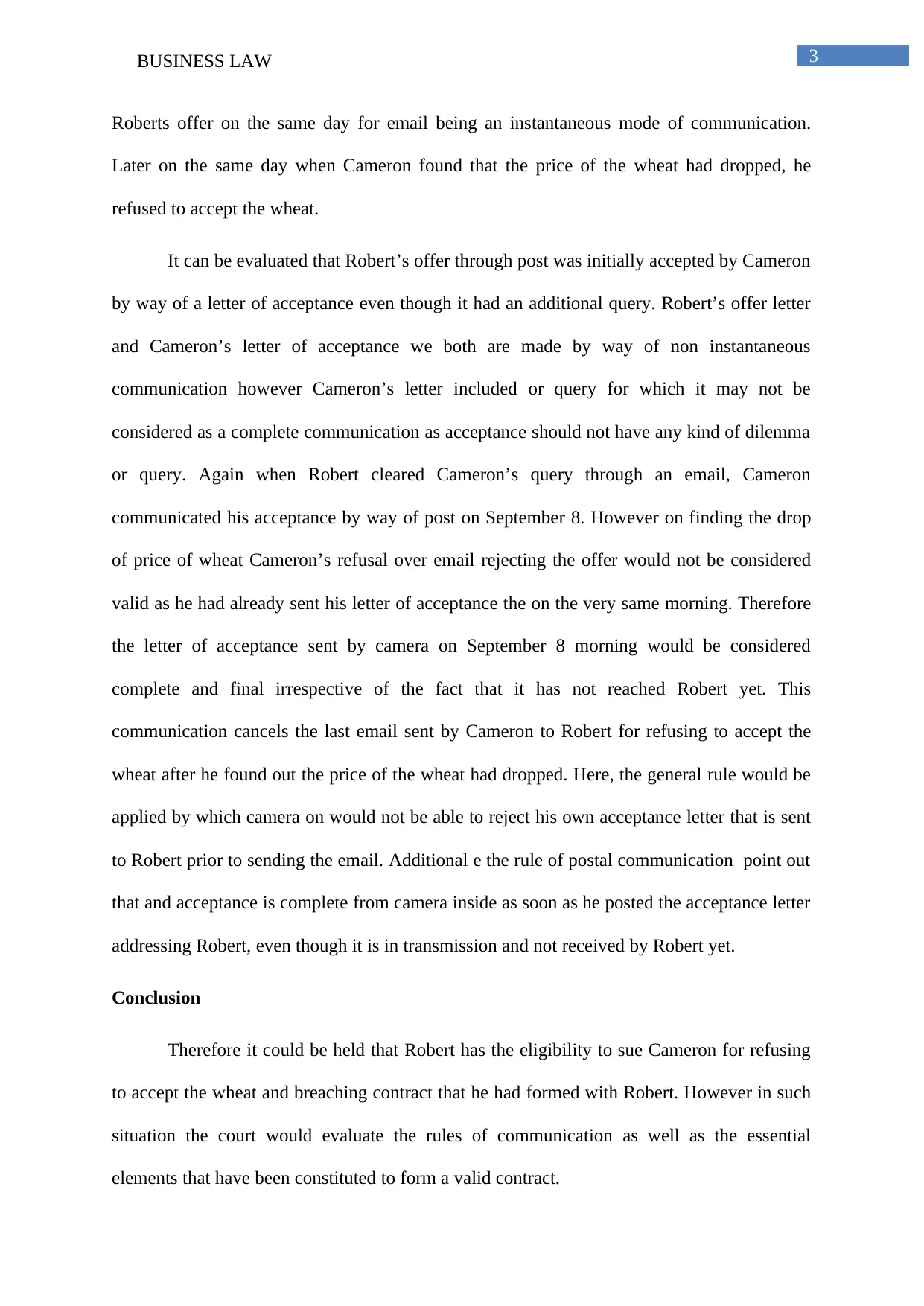
3BUSINESS LAW
Roberts offer on the same day for email being an instantaneous mode of communication.
Later on the same day when Cameron found that the price of the wheat had dropped, he
refused to accept the wheat.
It can be evaluated that Robert’s offer through post was initially accepted by Cameron
by way of a letter of acceptance even though it had an additional query. Robert’s offer letter
and Cameron’s letter of acceptance we both are made by way of non instantaneous
communication however Cameron’s letter included or query for which it may not be
considered as a complete communication as acceptance should not have any kind of dilemma
or query. Again when Robert cleared Cameron’s query through an email, Cameron
communicated his acceptance by way of post on September 8. However on finding the drop
of price of wheat Cameron’s refusal over email rejecting the offer would not be considered
valid as he had already sent his letter of acceptance the on the very same morning. Therefore
the letter of acceptance sent by camera on September 8 morning would be considered
complete and final irrespective of the fact that it has not reached Robert yet. This
communication cancels the last email sent by Cameron to Robert for refusing to accept the
wheat after he found out the price of the wheat had dropped. Here, the general rule would be
applied by which camera on would not be able to reject his own acceptance letter that is sent
to Robert prior to sending the email. Additional e the rule of postal communication point out
that and acceptance is complete from camera inside as soon as he posted the acceptance letter
addressing Robert, even though it is in transmission and not received by Robert yet.
Conclusion
Therefore it could be held that Robert has the eligibility to sue Cameron for refusing
to accept the wheat and breaching contract that he had formed with Robert. However in such
situation the court would evaluate the rules of communication as well as the essential
elements that have been constituted to form a valid contract.
Roberts offer on the same day for email being an instantaneous mode of communication.
Later on the same day when Cameron found that the price of the wheat had dropped, he
refused to accept the wheat.
It can be evaluated that Robert’s offer through post was initially accepted by Cameron
by way of a letter of acceptance even though it had an additional query. Robert’s offer letter
and Cameron’s letter of acceptance we both are made by way of non instantaneous
communication however Cameron’s letter included or query for which it may not be
considered as a complete communication as acceptance should not have any kind of dilemma
or query. Again when Robert cleared Cameron’s query through an email, Cameron
communicated his acceptance by way of post on September 8. However on finding the drop
of price of wheat Cameron’s refusal over email rejecting the offer would not be considered
valid as he had already sent his letter of acceptance the on the very same morning. Therefore
the letter of acceptance sent by camera on September 8 morning would be considered
complete and final irrespective of the fact that it has not reached Robert yet. This
communication cancels the last email sent by Cameron to Robert for refusing to accept the
wheat after he found out the price of the wheat had dropped. Here, the general rule would be
applied by which camera on would not be able to reject his own acceptance letter that is sent
to Robert prior to sending the email. Additional e the rule of postal communication point out
that and acceptance is complete from camera inside as soon as he posted the acceptance letter
addressing Robert, even though it is in transmission and not received by Robert yet.
Conclusion
Therefore it could be held that Robert has the eligibility to sue Cameron for refusing
to accept the wheat and breaching contract that he had formed with Robert. However in such
situation the court would evaluate the rules of communication as well as the essential
elements that have been constituted to form a valid contract.
Paraphrase This Document
Need a fresh take? Get an instant paraphrase of this document with our AI Paraphraser
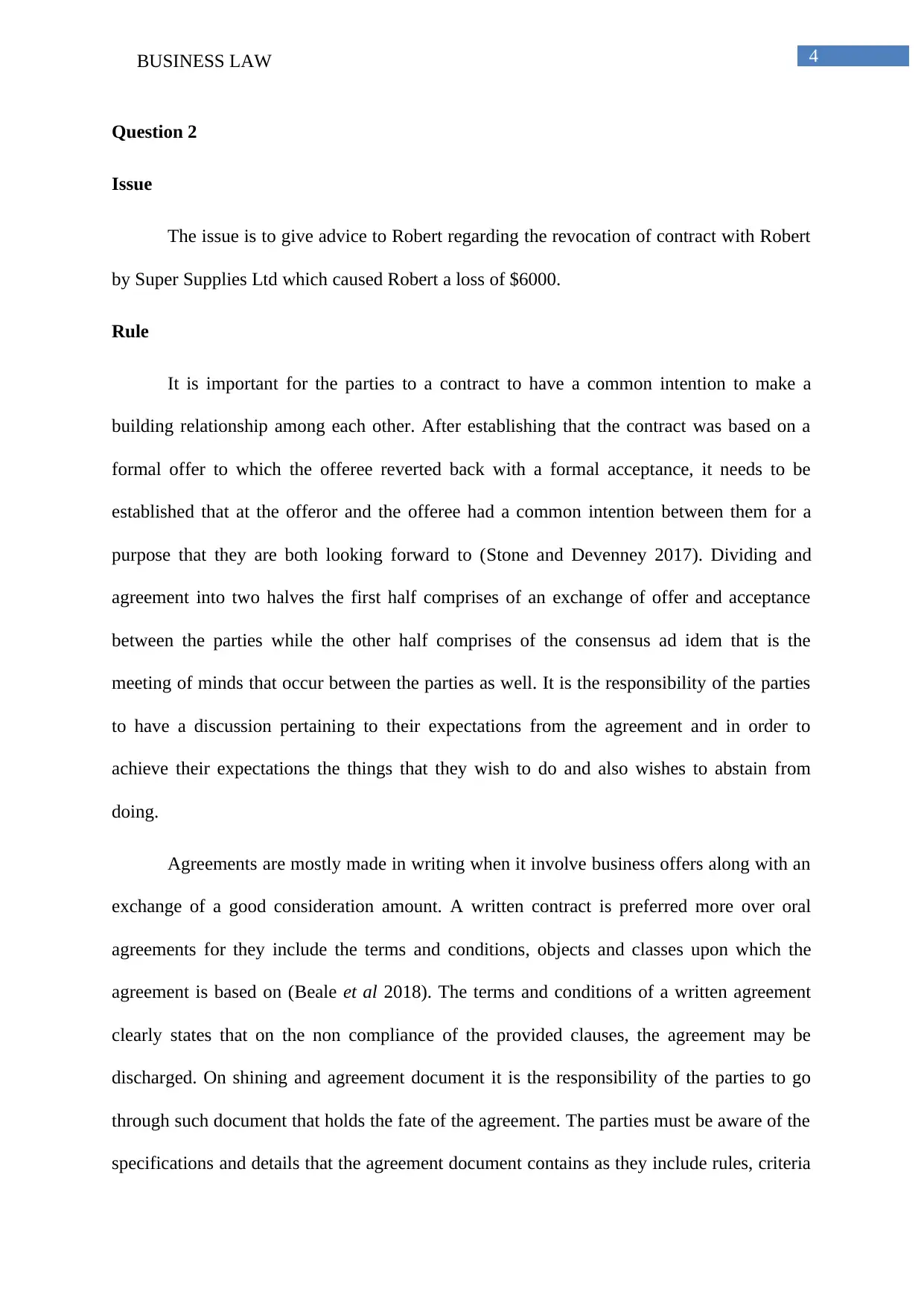
4BUSINESS LAW
Question 2
Issue
The issue is to give advice to Robert regarding the revocation of contract with Robert
by Super Supplies Ltd which caused Robert a loss of $6000.
Rule
It is important for the parties to a contract to have a common intention to make a
building relationship among each other. After establishing that the contract was based on a
formal offer to which the offeree reverted back with a formal acceptance, it needs to be
established that at the offeror and the offeree had a common intention between them for a
purpose that they are both looking forward to (Stone and Devenney 2017). Dividing and
agreement into two halves the first half comprises of an exchange of offer and acceptance
between the parties while the other half comprises of the consensus ad idem that is the
meeting of minds that occur between the parties as well. It is the responsibility of the parties
to have a discussion pertaining to their expectations from the agreement and in order to
achieve their expectations the things that they wish to do and also wishes to abstain from
doing.
Agreements are mostly made in writing when it involve business offers along with an
exchange of a good consideration amount. A written contract is preferred more over oral
agreements for they include the terms and conditions, objects and classes upon which the
agreement is based on (Beale et al 2018). The terms and conditions of a written agreement
clearly states that on the non compliance of the provided clauses, the agreement may be
discharged. On shining and agreement document it is the responsibility of the parties to go
through such document that holds the fate of the agreement. The parties must be aware of the
specifications and details that the agreement document contains as they include rules, criteria
Question 2
Issue
The issue is to give advice to Robert regarding the revocation of contract with Robert
by Super Supplies Ltd which caused Robert a loss of $6000.
Rule
It is important for the parties to a contract to have a common intention to make a
building relationship among each other. After establishing that the contract was based on a
formal offer to which the offeree reverted back with a formal acceptance, it needs to be
established that at the offeror and the offeree had a common intention between them for a
purpose that they are both looking forward to (Stone and Devenney 2017). Dividing and
agreement into two halves the first half comprises of an exchange of offer and acceptance
between the parties while the other half comprises of the consensus ad idem that is the
meeting of minds that occur between the parties as well. It is the responsibility of the parties
to have a discussion pertaining to their expectations from the agreement and in order to
achieve their expectations the things that they wish to do and also wishes to abstain from
doing.
Agreements are mostly made in writing when it involve business offers along with an
exchange of a good consideration amount. A written contract is preferred more over oral
agreements for they include the terms and conditions, objects and classes upon which the
agreement is based on (Beale et al 2018). The terms and conditions of a written agreement
clearly states that on the non compliance of the provided clauses, the agreement may be
discharged. On shining and agreement document it is the responsibility of the parties to go
through such document that holds the fate of the agreement. The parties must be aware of the
specifications and details that the agreement document contains as they include rules, criteria
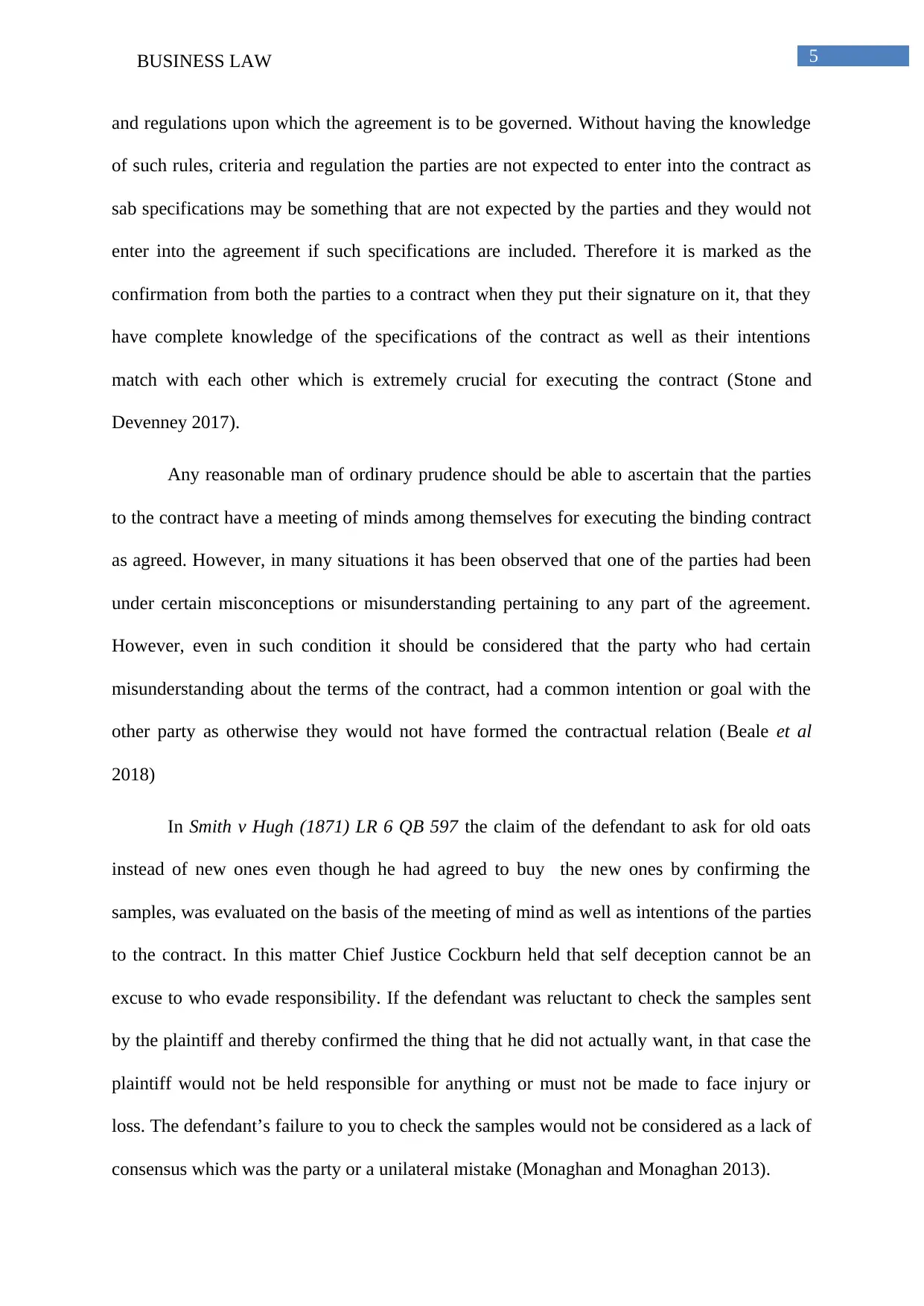
5BUSINESS LAW
and regulations upon which the agreement is to be governed. Without having the knowledge
of such rules, criteria and regulation the parties are not expected to enter into the contract as
sab specifications may be something that are not expected by the parties and they would not
enter into the agreement if such specifications are included. Therefore it is marked as the
confirmation from both the parties to a contract when they put their signature on it, that they
have complete knowledge of the specifications of the contract as well as their intentions
match with each other which is extremely crucial for executing the contract (Stone and
Devenney 2017).
Any reasonable man of ordinary prudence should be able to ascertain that the parties
to the contract have a meeting of minds among themselves for executing the binding contract
as agreed. However, in many situations it has been observed that one of the parties had been
under certain misconceptions or misunderstanding pertaining to any part of the agreement.
However, even in such condition it should be considered that the party who had certain
misunderstanding about the terms of the contract, had a common intention or goal with the
other party as otherwise they would not have formed the contractual relation (Beale et al
2018)
In Smith v Hugh (1871) LR 6 QB 597 the claim of the defendant to ask for old oats
instead of new ones even though he had agreed to buy the new ones by confirming the
samples, was evaluated on the basis of the meeting of mind as well as intentions of the parties
to the contract. In this matter Chief Justice Cockburn held that self deception cannot be an
excuse to who evade responsibility. If the defendant was reluctant to check the samples sent
by the plaintiff and thereby confirmed the thing that he did not actually want, in that case the
plaintiff would not be held responsible for anything or must not be made to face injury or
loss. The defendant’s failure to you to check the samples would not be considered as a lack of
consensus which was the party or a unilateral mistake (Monaghan and Monaghan 2013).
and regulations upon which the agreement is to be governed. Without having the knowledge
of such rules, criteria and regulation the parties are not expected to enter into the contract as
sab specifications may be something that are not expected by the parties and they would not
enter into the agreement if such specifications are included. Therefore it is marked as the
confirmation from both the parties to a contract when they put their signature on it, that they
have complete knowledge of the specifications of the contract as well as their intentions
match with each other which is extremely crucial for executing the contract (Stone and
Devenney 2017).
Any reasonable man of ordinary prudence should be able to ascertain that the parties
to the contract have a meeting of minds among themselves for executing the binding contract
as agreed. However, in many situations it has been observed that one of the parties had been
under certain misconceptions or misunderstanding pertaining to any part of the agreement.
However, even in such condition it should be considered that the party who had certain
misunderstanding about the terms of the contract, had a common intention or goal with the
other party as otherwise they would not have formed the contractual relation (Beale et al
2018)
In Smith v Hugh (1871) LR 6 QB 597 the claim of the defendant to ask for old oats
instead of new ones even though he had agreed to buy the new ones by confirming the
samples, was evaluated on the basis of the meeting of mind as well as intentions of the parties
to the contract. In this matter Chief Justice Cockburn held that self deception cannot be an
excuse to who evade responsibility. If the defendant was reluctant to check the samples sent
by the plaintiff and thereby confirmed the thing that he did not actually want, in that case the
plaintiff would not be held responsible for anything or must not be made to face injury or
loss. The defendant’s failure to you to check the samples would not be considered as a lack of
consensus which was the party or a unilateral mistake (Monaghan and Monaghan 2013).
⊘ This is a preview!⊘
Do you want full access?
Subscribe today to unlock all pages.

Trusted by 1+ million students worldwide
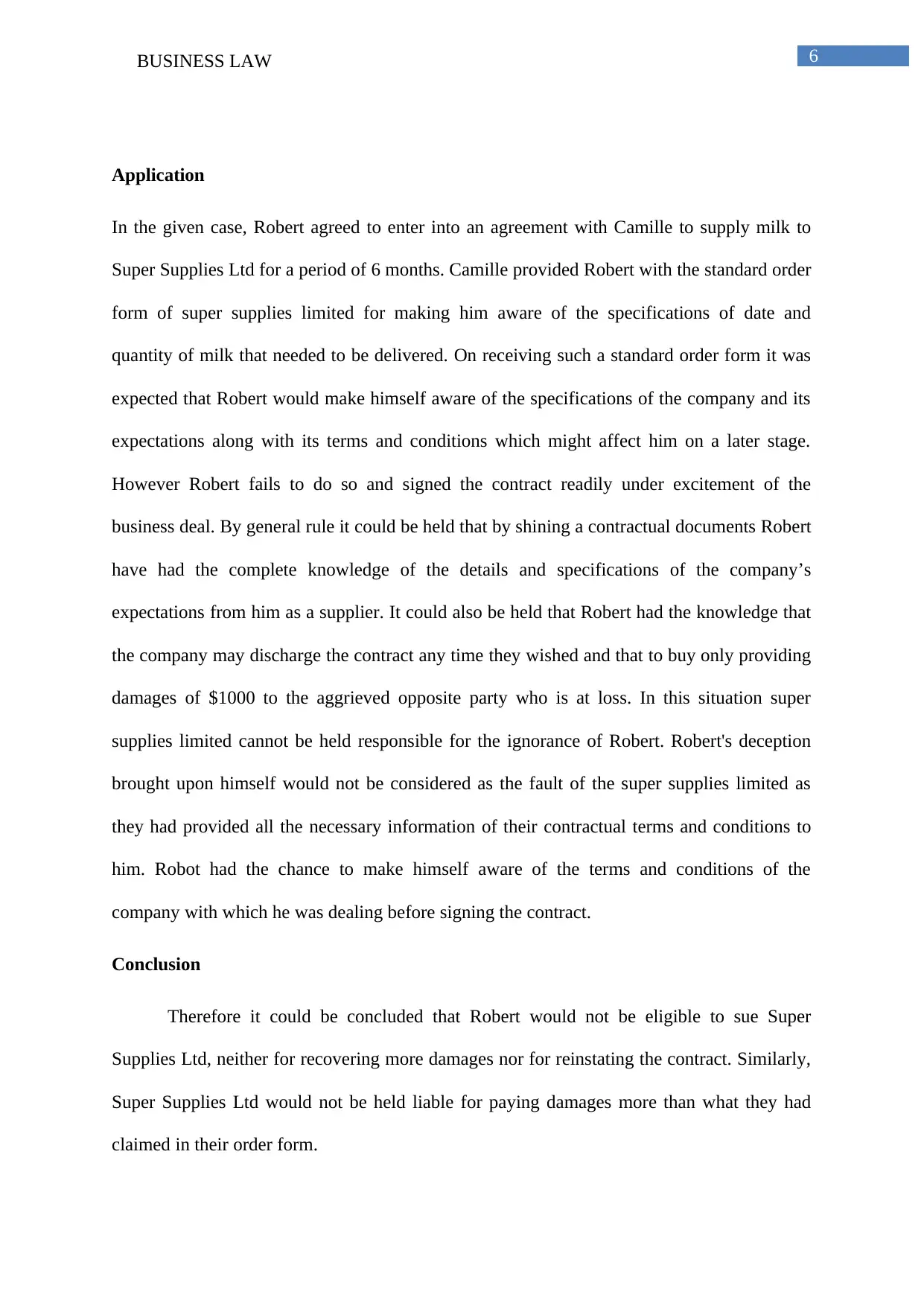
6BUSINESS LAW
Application
In the given case, Robert agreed to enter into an agreement with Camille to supply milk to
Super Supplies Ltd for a period of 6 months. Camille provided Robert with the standard order
form of super supplies limited for making him aware of the specifications of date and
quantity of milk that needed to be delivered. On receiving such a standard order form it was
expected that Robert would make himself aware of the specifications of the company and its
expectations along with its terms and conditions which might affect him on a later stage.
However Robert fails to do so and signed the contract readily under excitement of the
business deal. By general rule it could be held that by shining a contractual documents Robert
have had the complete knowledge of the details and specifications of the company’s
expectations from him as a supplier. It could also be held that Robert had the knowledge that
the company may discharge the contract any time they wished and that to buy only providing
damages of $1000 to the aggrieved opposite party who is at loss. In this situation super
supplies limited cannot be held responsible for the ignorance of Robert. Robert's deception
brought upon himself would not be considered as the fault of the super supplies limited as
they had provided all the necessary information of their contractual terms and conditions to
him. Robot had the chance to make himself aware of the terms and conditions of the
company with which he was dealing before signing the contract.
Conclusion
Therefore it could be concluded that Robert would not be eligible to sue Super
Supplies Ltd, neither for recovering more damages nor for reinstating the contract. Similarly,
Super Supplies Ltd would not be held liable for paying damages more than what they had
claimed in their order form.
Application
In the given case, Robert agreed to enter into an agreement with Camille to supply milk to
Super Supplies Ltd for a period of 6 months. Camille provided Robert with the standard order
form of super supplies limited for making him aware of the specifications of date and
quantity of milk that needed to be delivered. On receiving such a standard order form it was
expected that Robert would make himself aware of the specifications of the company and its
expectations along with its terms and conditions which might affect him on a later stage.
However Robert fails to do so and signed the contract readily under excitement of the
business deal. By general rule it could be held that by shining a contractual documents Robert
have had the complete knowledge of the details and specifications of the company’s
expectations from him as a supplier. It could also be held that Robert had the knowledge that
the company may discharge the contract any time they wished and that to buy only providing
damages of $1000 to the aggrieved opposite party who is at loss. In this situation super
supplies limited cannot be held responsible for the ignorance of Robert. Robert's deception
brought upon himself would not be considered as the fault of the super supplies limited as
they had provided all the necessary information of their contractual terms and conditions to
him. Robot had the chance to make himself aware of the terms and conditions of the
company with which he was dealing before signing the contract.
Conclusion
Therefore it could be concluded that Robert would not be eligible to sue Super
Supplies Ltd, neither for recovering more damages nor for reinstating the contract. Similarly,
Super Supplies Ltd would not be held liable for paying damages more than what they had
claimed in their order form.
Paraphrase This Document
Need a fresh take? Get an instant paraphrase of this document with our AI Paraphraser
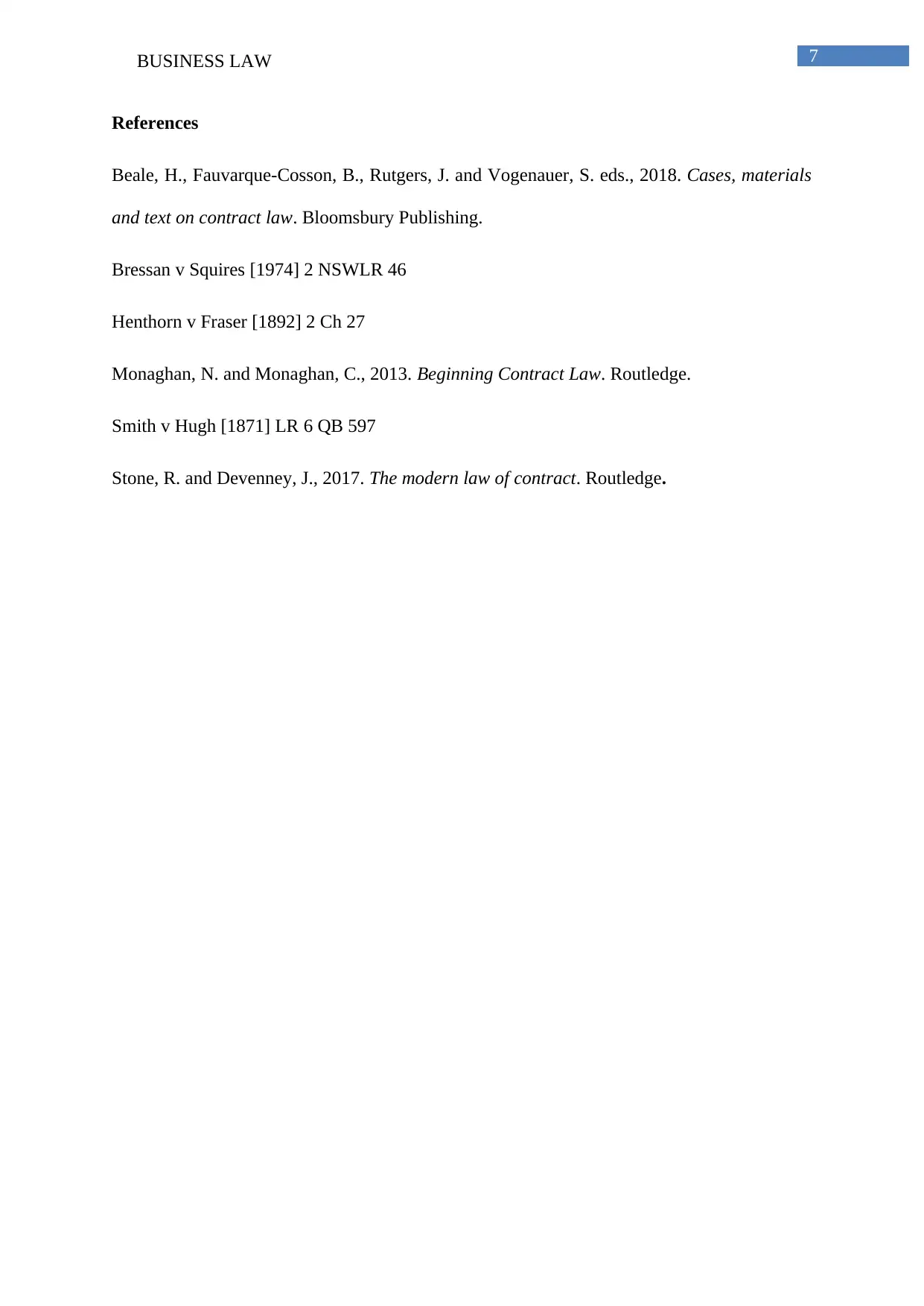
7BUSINESS LAW
References
Beale, H., Fauvarque-Cosson, B., Rutgers, J. and Vogenauer, S. eds., 2018. Cases, materials
and text on contract law. Bloomsbury Publishing.
Bressan v Squires [1974] 2 NSWLR 46
Henthorn v Fraser [1892] 2 Ch 27
Monaghan, N. and Monaghan, C., 2013. Beginning Contract Law. Routledge.
Smith v Hugh [1871] LR 6 QB 597
Stone, R. and Devenney, J., 2017. The modern law of contract. Routledge.
References
Beale, H., Fauvarque-Cosson, B., Rutgers, J. and Vogenauer, S. eds., 2018. Cases, materials
and text on contract law. Bloomsbury Publishing.
Bressan v Squires [1974] 2 NSWLR 46
Henthorn v Fraser [1892] 2 Ch 27
Monaghan, N. and Monaghan, C., 2013. Beginning Contract Law. Routledge.
Smith v Hugh [1871] LR 6 QB 597
Stone, R. and Devenney, J., 2017. The modern law of contract. Routledge.
1 out of 8
Related Documents
Your All-in-One AI-Powered Toolkit for Academic Success.
+13062052269
info@desklib.com
Available 24*7 on WhatsApp / Email
![[object Object]](/_next/static/media/star-bottom.7253800d.svg)
Unlock your academic potential
Copyright © 2020–2026 A2Z Services. All Rights Reserved. Developed and managed by ZUCOL.





